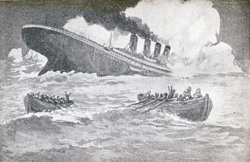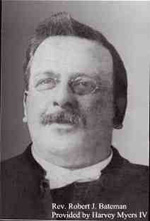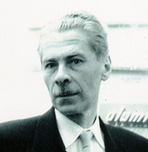|
|
|
 |
Was Doctor/Minister the Titanic’s Bravest Man?
Posted on 20 February 2012, 15:23
As the Titanic plunged to the bottom of the Atlantic Ocean 100 years ago this April 15, Colonel Archibald Gracie, a New York resident, was sucked down with it. However, he somehow managed to surface and survive. Gracie could not judge how long he was under water, but it “seemed an interminable time until I could scarcely stand it any longer.” He concluded that the life preserver he wore prevented him from being drawn down by suction to a greater depth. In a book he wrote later that year about the experience, he recalled thinking that he wanted to convey the news of how he died to his loved ones at home. And he remembered praying and saying to his wife, “Good-bye until we meet again in heaven.”

Gracie was one of the last, if not the last, survivor to leave the ship. About 10 minutes before the ship went down, he and several others struggled to launch a collapsible life boat. Just as they broke it free, they were hit by a giant wave, apparently from one of the ship’s four funnels, i.e., smoke stacks, collapsing and falling. “The big wave carried the boat off,” Gracie related. When he finally surfaced, Gracie grabbed on to a piece of floating debris and noticed that the ship was gone. He then saw the collapsible life boat overturned and made his way to it, climbing onto it with a dozen or more men already on it. “The agonizing cries of death from over a thousand throats, the wails and groans of the suffering, the shrieks of the terror-stricken and the awful gaspings for breath of those in the last throes of drowning, none of us will ever forget to our dying days,” he recalled those moments. “‘Help! Help! Boat ahoy! Boat ahoy!’ and ‘My God! My God!’ were the heartrending cries and shrieks of men, which floated to us over the surface of the dark waters continuously for the next hour, but as the time went on, growing weaker and weaker until they died out entirely.”
Gracie recalled no stress during the time he was under water and felt “full of vigor” when he surfaced and as he made his way to the life boat. He credited his ability to undergo the ordeal to his physical, mental, and religious training. In all, 30 men, mostly crew members, ended up on the bottom-up boat. When it was fully occupied, those on board had to push away others who were trying to mount it. It was during this time that Gracie heard what he called a “transcendent piece of heroism that will remain fixed in my memory as the most sublime and coolest exhibition of courage and cheerful resignation to fate and fearlessness of death.” This was when one swimmer was refused assistance and turned away by others on the raft. In a “deep manly voice of a powerful man,” which Gracie did not recognize, Gracie heard the swimmer reply: “All right, boys; good luck and God bless you.” The man then swam away.
To my knowledge the brave swimmer was never identified. When I first read Gracie’s book many years ago, I wondered if that swimmer might have been William T. Stead, a British journalist who was observed by other passengers courageously facing up to his demise as the ship was sinking. But as I did research for my recently-released book, Transcending the Titanic I came upon information suggesting that Stead was hit by the falling funnel, and other information that leads me to believe that the brave swimmer was more likely Robert J. Bateman, (below) a 51-year-old Baptist minister and physician from Jacksonville, Florida. A second-class passenger, Bateman had been visiting relatives in Bristol, England and taking part in a revival. He was returning to Jacksonville with his sister-in-law, Ada Balls, and other members of the revival group. Ada Balls later recalled: “Brother forced me into the last boat, saying he would follow me later. I believe I was the last person to leave the ship. Brother threw his overcoat over my shoulders as the boat was being lowered away and as we neared the water, he took his black necktie and threw it to me with the words, ‘Goodbye, God bless you!’”

As Bateman reportedly said “God bless you!” to his sister-in-law before leaving her, and the rejected swimmer said “God bless you!” before swimming away, Bateman emerges as the best candidate for the heroic swimmer mentioned by Gracie. Moreover, Bateman was a second-class passenger and Gracie a first-class passenger, which could explain why Gracie did not recognize the man’s voice.
Ten days after the disaster, Bateman’s widow received a letter her husband had mailed to her when the Titanic had stopped for more passengers in Ireland. “I feel that my trip has not been in vain,” Bateman wrote. “God has singularly blessed me. We had a glorious revival… It was the Time of My Life.” His nephew, Tom, also received a letter mailed from Ireland. “Tom,” he wrote, “if this ship goes to the bottom, I shall not be there, I shall be up yonder. Think of it!”
Later, when the family opened up Bateman’s locked roll-top desk, a poem he had written was found on top of his papers. It read:
Do you shudder as you picture
All the horrors of that hour?
Ah! But Jesus was beside me
To sustain me by His power.
And He came Himself to meet me
In that way so hard to tread
And with Jesus’ arm to cling to
Could I have one doubt or dread?
Bateman’s body was recovered three weeks later by a cable-laying vessel.
Michael Tymn’s latest book Transcending the Titanic: Beyond Death’s Door is published by White Crow Books and available from Amazon and all good online book stores, along with The Afterlife Revealed: What Happens After we Die
Paperback Kindle
Transcending the Titanic by Michael Tymn
Paperback Kindle

Next post: March 5. More about William T. Stead in an April post.
Read comments or post one of your own
|
 |
109-year-old Scientist Continues to Pursue Illumination
Posted on 03 February 2012, 23:13
“Imagine for a moment how much human life would change if this question were answered in the positive,” Dr. Alexander Imich (below) writes in his 1995 book, Incredible Tales of the Paranormal, referring to the question of whether consciousness survives the death of the physical .body, “how much easier it would be to live through the pain and misery of our existence on this planet, if we were sure these were only temporary ills.”

Although Imich, who turns 109 this Saturday, February 4, is pretty much confined to his Manhattan apartment and somewhat limited in his research activities these days, he has spent a good part of the last 85 years, studying the evidence for the reality of a non-mechanistic universe and life after death.
“My goal in life has always been illumination,” Imich told me when I interviewed him in 2003 on the occasion of his 100th birthday. Although I haven’t had a chance to speak with Imich in a few years, I have exchanged a few e-mail with him and he still seems to be pursuing illumination, while also anxious to explore other dimensions of reality first hand. “I am very interested in finding out how things are on the ‘other side,’” he wrote to me in an e-mail before his 108th birthday.
In his 1995 book, Imich relates some of the best evidence for the reality of psychic phenomena, including his own investigation during the 1920s of the Polish medium referred to as Matylda S. He tells of rings vanishing from the fingers of one person and turning up on another, spirits materializing out of nowhere, large objects (apports) appearing in front of him in thin air. “I will never forget the kiss of a phantom,” he wrote. “An invisible face, whose breath I could distinctly hear and feel on my face, kissed mine. It was a strong and pleasant sensation.”
He was even more impressed with the phenomena he observed in recent years with physical mediums Joseph Nuzum and Dr. Safwat El Amin. He saw Nuzum levitate and move through the air in his (Imich’s) hotel room, and has observed many apports with El Amin, including one in which thousands of dollars in cash appeared in a big box near Imich’s laser printer but then disappeared within a few seconds. He also witnessed spirit photography in which his deceased wife appeared next to him in a photograph.
Imich’s interest in psychical research and parapsychology began during the 1920s. As a scientist, he approached his investigations with proper skepticism, but came away from his many sittings with Matylda convinced that there was no fraud or chicanery involved. “The shock was too strong,” Imich wrote of his first two sittings with Matylda. “It was now necessary to bring new order to my world view, to find a place for the discovery of this extraordinary reality. So many conceptions of my early years would have to be changed!” Imich began to wonder why his fellow scientists were interested in investigating things that paled in comparison with the question of life after death. He decided then to devote his life to parapsychology.
Born in Czestochowa, Poland, the third son of a corporate bank president and founder of a Jewish hospital, young “Alech” was educated at home until the age of 10 by a governess and several tutors. Although his town was under German occupation during WWI, Imich was able to continue his education. However, when the Russian attacked Poland in 1918, Imich, then 15, joined the army and became a truck driver. After the Bolsheviks were repelled, he returned to school, studying chemistry, mineralogy, botany, biology, astronomy, advanced optics, and mathematical logic. His Ph.D. thesis at the University of Krakow was on the digestive systems of microscopic worms.
Employed as a chemist before WWII, Imich, who speaks Polish, English, French, and German, was commissioned by the Russians to head up a soap-making factory during the war. When the Russians insisted that he become a Russian citizen, Imich refused. He and his wife Vela were then put on a cattle train and sent to a prison camp near the White Sea. “There were about 600 people – all Jews,” Imich said, recalling an incident in which the camp commander put a gun to his head and clicked it while demanding information about his fellow prisoners. When Imich told him that he did not speak Yiddish and therefore did not have the information, the commander sent him back to his barracks. He spent a year-and-a-half in the prison camp. Upon returning to Poland at the end of the war, he found that most of his relatives and friends had been murdered in concentration camps.\
Imich came to the United States with his wife shortly after World War II, initially living in Bucks County, Pennsylvania. After Vela transitioned in 1986, he moved to New York City and continued his research into psychic phenomena. Although he has found personal fulfillment in parapsychology, Imich is frustrated at the reluctance of mainstream science to accept the evidence for psychic phenomena and the afterlife. As he sees it, the religious superstitions of the medieval age continue to influence the scientific community while there is little funding for research.
Imich recognizes that the existence of ESP and other psychic phenomena, such as levitations, does not necessarily lead to a belief in an afterlife, but it clearly defies the mechanistic theory. He says that “communications from and appearances of deceased people” have been the major phenomena leading to his belief that consciousness survives death.
“All creators of the world’s great religions – Moses, Jesus, Muhammad, Buddha and Krishna – taught us that the final goal of all creation is the return to its Spiritual Source,” Imich says. Parapsychology, studying phenomena produced by a non-material, spiritual power, is the only one of all sciences that is recognizing the ontological existence of the spiritual world. Parapsychology, bridging the matter-energy-mind axis and speeding up the evolutionary fulfillment of humankind’s destiny, is therefore the most important scientific endeavor. Promoting parapsychological research is the right direction in the pursuit of truth.”
As for his longevity, Imich doubts that his beliefs have anything to do with it, although he does feel that maintaining a strong interest in something as one ages does have a positive effect on health and longevity. “I am eating less than people of my age and size,” he adds, “and this, besides good genes, might be the most important factor of my longevity.”
Michael Tymn’s book The Afterlife Revealed: What Happens After we Die is published by White Crow Books and available from Amazon and all good online book stores. Michael’s forthcoming book Transcending the Titanic: Beyond Death’s Door is published in March 2012 by White Crow.
Transcending the Titanic by Michael Tymn
Paperback Kindle

Next blog Feb. 20
Read comments or post one of your own
|
|
|
|